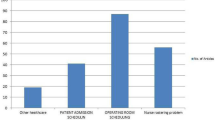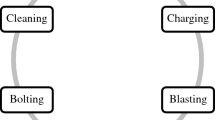Abstract
The resource-constrained project scheduling problem (RCPSP) has been widely studied. A fundamental assumption of the basic type of RCPSP is that activity durations are deterministic (i.e., they are known in advance). In reality, however, this is almost never the case. In this article, we illustrate why it is important to incorporate activity duration uncertainty, and develop an exact procedure to optimally solve the stochastic resource-constrained scheduling problem. A computational experiment shows that our approach works best when solving small- to medium-sized problem instances where activity durations have a moderate-to-high level of variability. For this setting, our model outperforms the existing state-of-the-art. In addition, we use our model to assess the optimality gap of existing heuristic approaches, and investigate the impact of making scheduling decisions also during the execution of an activity rather than only at the end of an activity.






Similar content being viewed by others
References
Ashtiani, B., Leus, R., & Aryanezhad, M. B. (2011). New competitive results for the stochastic resource-constrained project scheduling problem: Exploring the benefits of pre-processing. Journal of Scheduling, 14(2), 157–171.
Ballestín, F. (2007). When it is worthwhile to work with the stochastic RCPSP? Journal of Scheduling, 10(3), 153–166.
Ballestín, F., & Leus, R. (2009). Resource-constrained project scheduling for timely project completion with stochastic activity durations. Production and Operations Management, 18(4), 459–474.
Bidot, J., Vidal, T., Laborie, P., & Beck, J. C. (2009). A theoretic and practical framework for scheduling in a stochastic environment. Journal of Scheduling, 12(3), 315–344.
Buss, A. H., & Rosenblatt, M. J. (1997). Activity delay in stochastic project networks. Operations Research, 45(1), 126–139.
Creemers, S., Leus, R., & Lambrecht, M. (2010). Scheduling Markovian PERT networks to maximize the net present value. Operations Research Letters, 38(1), 51–56.
Creemers, S., Demeulemeester, E., & Van de Vonder, S. (2014). A new approach for quantitative risk analysis. Annals of Operations Research, 213(1), 27–65.
Demeulemeester, E., & Herroelen, W. (2002). Project scheduling: A research handbook. AH Dordrecht: Kluwer Academic Publishers Group.
Fu, N., Lau, H. C., Varakantham, P., & Xiao, F. (2012). Robust local search for solving RCPSP/max with durational uncertainty. Journal of Artificial Intelligence Research, 43, 43–86.
Golenko-Ginzburg, D., & Gonik, A. (1997). Stochastic network project scheduling with non-consumable limited resources. International Journal of Production Economics, 48(1), 29–37.
Herroelen, W., & Leus, R. (2005). Project scheduling under uncertainty: Survey and research potentials. European Journal of Operational Research, 165(2), 289–306.
Igelmund, G., & Radermacher, F. J. (1983). Preselective strategies for the optimization of stochastic project networks under resource constraints. Networks, 13(1), 1–28.
Kolisch, R., & Sprecher, A. (1996). PSPLIB—A project scheduling problem library. European Journal of Operational Research, 96(1), 205–216.
Kulkarni, V., & Adlakha, V. (1986). Markov and Markov-regenerative PERT networks. Operations Research, 34(5), 769–781.
Latouche, G., & Ramaswami, V. (1999). Introduction to matrix analytic methods in stochastic modeling. Philadelphia: American Statistical Association and the Society for Industrial and Applied Mathematics.
Möhring, R. H. (2000). Scheduling under uncertainty: Optimizing against a randomizing adversary. Lecture Notes in Computer Science, 1913, 15–26.
Neumann, K., Schwindt, C., & Zimmermann, J. (2003). Project scheduling with time windows and scarce resources. Berlin: Springer.
Neuts, M. F. (1981). Matrix-geometric solutions in stochastic models. Baltimore: Johns Hopkins University Press.
Osogami, T. (2005). Analysis of multiserver systems via dimensionality reduction of Markov chains. PhD Thesis, Carnegie Mellon University.
Patterson, J. H. (1984). A comparison of exact approaches for solving the multiple constrained resource, project scheduling problem. Management Science, 30(7), 854–867.
Sobel, M. J., Szmerekovsky, J. G., & Tilson, V. (2009). Scheduling projects with stochastic activity duration to maximize expected net present value. European Journal of Operational Research, 198(1), 697–705.
Stork, F. (2001). Stochastic resource-constrained project scheduling. PhD Thesis, Technische Universität Berlin.
Tsai, Y.-W., & Gemmill, D. D. (1998). Using tabu search to schedule activities of stochastic resource-constrained projects. European Journal of Operational Research, 111(1), 129–141.
Author information
Authors and Affiliations
Corresponding author
Rights and permissions
About this article
Cite this article
Creemers, S. Minimizing the expected makespan of a project with stochastic activity durations under resource constraints. J Sched 18, 263–273 (2015). https://doi.org/10.1007/s10951-015-0421-5
Published:
Issue Date:
DOI: https://doi.org/10.1007/s10951-015-0421-5




